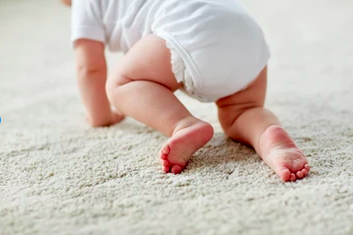Every new skill your baby learns, whether it be rolling, crawling, walking or language development can have a huge impact on their sleep. When they’ve just developed the ability to do something new they often struggle to stop doing it – even when they’re asleep!
How do developmental milestones impact my child’s sleep?

Developmental milestones will usually impact sleep in two ways.
1. Your baby/child will struggle to fall asleep
Imagine you’ve got a stressful day tomorrow. Whether it be work, family, a flight to catch or a deadline. We’ve all been there. You lie down in bed, knowing you really need a good sleep, and your brain is buzzing! This feeling of being unable to switch off is what your baby or child feels around these times of big developmental leaps. Their brains are busy creating new neural pathways – the connections between the cells of their brain which occur when we learn a new skill. All of this makes it much harder for them to shut off and sleep.
2. Your baby/child will struggle to go back to sleep after a night waking
When your baby or child learns a new skill, all their body desperately wants to do is practise it – even in the middle of the night! Particularly with physical milestones like crawling or walking, it’s not uncommon to find your child wakes in the night and then spends an hour or two wide awake wanting to play and practise this new skill.
How long does it last?
Thankfully, these changes to sleep often only last a week or so. They usually occur in the lead up to your child learning a new skill, and just after they have mastered it. It can, however, derail a previously good sleep routine if you don’t address it early.
What can I do?
These developmental milestones aren’t within our control. They’re going to happen eventually, and they will probably disrupt sleep. But how we as parents deal with it can make all the difference between it being a few nights of disrupted sleep versus derailing your child’s sleep in the long term.

Physical milestones like rolling, crawling and walking
- Here are some ideas:
- Get down on the floor with them and crawl.
- Have running races.
- Create an obstacle course (even indoors!). Take cushions off the sofa, incorporate a Pikler triangle or small step and plan a route around the living room. For crawling babies, making cushion obstacle courses on the floor is great for helping them practise crawling over or around obstacles.
- Have ‘big body play time’ after dinner. Set aside a 10-15 minute period each evening after dinner for big body play time. If the weather is suitable, head outdoors into daylight. Research has shown that not having enough exposure to broad spectrum daylight negatively impacts sleep. Run, crawl, jump. Give piggy backs. Rough housing. Tickle fights. Anything goes. Lots of physical touch and interaction to get the last of their energy out before bath and bedtime.
Separation Anxiety
Whilst this might not be considered a big developmental leap, the appearance of separation anxiety will undoubtably impact on your child’s sleep. Often appearing between 8-12 months, this occurs when your baby begins to develop a concept called object permanence. If young babies can’t feel or see something, they think it no longer exists.
This is why peek-a-boo is so fun for them – they literally think you have disappeared and magically come back again! Around the age of 8 months babies hit a developmental shift allowing them to understand that they and their mother are two separate beings (yep prior to this they think you’re one and the same!). Whilst this is really exciting for them when they realise they can crawl, roll or bum shuffle away to do something on their own, they then hit a stage of fear when they realise you can leave too, and before they fully understand object permanence – they think you’re gone for good!
Once they have a full understanding of this, the separation anxiety will ease. But before this full develops your little one may get very upset at you being out of their sight for even a short period of time.
When tackling separation anxiety:
- Never sneak out of the room/house. Always tell them you’re going and say goodbye or ‘be right back’.
- Play lots of games like peek a boo.
- Try hiding toys under a blanket/scarf for your baby to find.
- Practice popping out of the room and then returning almost immediately. Doing this multiple times a day will make a huge difference with separation anxiety. This is a completely normal phase, and most babies will begin to transition out of this after 12 months, but it’s likely that your baby may not want to be left alone to fall asleep and may need more company/reassurance to settle again during night wakings.
Cognitive leaps/language development

Even something like taking a big step forward in language development can cause your kiddos to struggle getting to, or staying, asleep. Extra wind down time will be key here. Get the big, stimulating things like bath time out of the way earlier in the bedtime routine and allow an extra 15-20 minutes of quiet play time to wind down before starting the bedtime routine. Reading, talking about your favourite parts of the day, and quiet play like drawing or building with Duplo blocks or magnetic tiles is a great way to help them wind down.
If you’re struggling with your child’s sleep, you can have 1-2-1 support from our Holistic Sleep Coach, Alissa Pemberton. Click here to ask Alissa a question or book a sleep support package




Leave a Comment
You must be logged in to post a comment.